I Dig Sports
MLB's villains or its gold standard? How the Los Angeles Dodgers got here
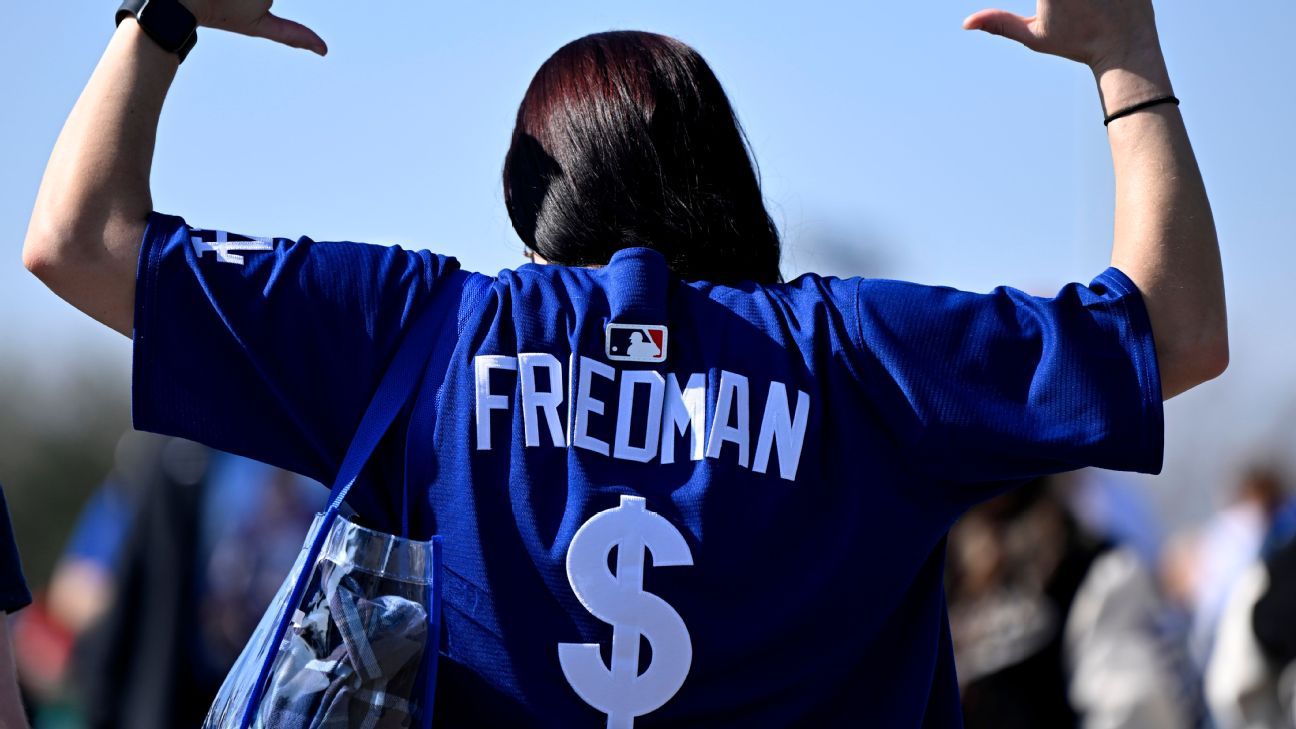
The Los Angeles Dodgers aren't just a baseball team these days. They are a symbol. For fans of the other 29 major league clubs, they are a source of either indignation or longing. For rival owners -- and the commissioner who answers to them -- they exemplify a widening payroll disparity that must be addressed. For players, and the union that represents them, they are a beacon, embodying all the traits of successful organizations: astute at player development, invested in behind-the-scenes components that make a difference and, most prominently, eager to pump their outsized revenues back into the roster.
The Dodgers employ seven players on nine-figure contracts, with five of those deals reached over the past 15 months. They also have the strongest farm system in the sport, according to ESPN's Kiley McDaniel. Their lineup is loaded and their rotation is decorated, but also their future looks bright and their resources seem limitless. And yet their chief architect, Andrew Friedman, isn't ready for a victory lap.
"It just doesn't really land with me in that way," Friedman, entering his 11th year as the Dodgers' president of baseball operations, said in a recent phone conversation. "I think once I get fired, once there's like real distance between being mired in the day-to-day and when I'm not, I will be able to look back at those things. But for us right now, it all feels very precarious.
"We've seen a lot of really successful organizations that fall off a cliff and take a while to build back. We don't take any of it for granted."
Nothing lasts forever. Every empire has fallen, every dynasty has faded. But what the Dodgers have built feels uniquely sustainable. A glaring reminder came last month, when Major League Baseball's commissioner, Rob Manfred, was asked whether outrage over the Dodgers' spending reminded him of how fans felt about the star-laden New York Yankees teams of the early 2000s, commonly referred to as "The Evil Empire."
The current Dodgers, Manfred said, "are probably more profitable on a percentage basis than the old Yankees were, meaning it could be more sustainable, so it is more of a problem."
The word "problem" depends on one's perspective. Dodgers fans certainly wouldn't describe it as such. As the team prepares to begin its season on Tuesday against the Chicago Cubs in Japan -- a country in which they are revered, in a series sponsored by their ownership group -- it's worth understanding how the Dodgers got here.
It was the result of their process, but it also required several monumental steps over the past dozen years.
Below is a look at their biggest leaps.
Jan. 28, 2013: They signed a media megadeal
At the start of 2013, the Dodgers, less than a year into Guggenheim's ownership, landed a massive local-media deal spanning 25 years and valued at $8.35 billion, or $334 million annually on average. But for the rest of that decade, it qualified as a massive headache. A stalemate between AT&T and Charter Communications meant more than half the Southern California market was unable to access the team's channel, SportsNet LA, from 2014 to 2020.
As the impasse continued and tensions escalated, the Dodgers' media deal came to symbolize a growing clash between sports channels that demand higher fees and content distributors wary of making customers pay for content they do not consume. Now -- five years after the two sides finally struck a deal, airing Dodgers games on AT&T video platforms and nearly doubling the number of households to more than 3 million -- it exemplifies a growing disparity that is rattling the industry.
The Dodgers' local-media deal runs longer than most and is more expensive than any other, but here's the kicker, according to a source familiar with the deal: While most regional sports networks are set up as subsidiaries underneath a corporate entity, leaving them in the lurch when they fall into hard times -- like Diamond Sports Group, a former Sinclair subsidiary that was forced into bankruptcy when debt mounted and subscribers fell off -- the Dodgers have complete corporate backing from Charter, a massive media conglomerate.
So not only do the Dodgers generate far more in local media than any of their competitors, but at a time when the linear-cable model is drying up and teams face increasing uncertainty with RSN contracts that represent about 20% of revenues, their deal is relatively iron-clad. That is especially valuable considering they're in a division where three teams -- the San Diego Padres, Arizona Diamondbacks and Colorado Rockies -- have lost their local media deals.
Dec. 21, 2018: They swung a trade that streamlined their payroll
Four days before Christmas in 2018, the Dodgers executed a rare salary dump. Matt Kemp, Yasiel Puig, Alex Wood, Kyle Farmer and cash were sent to the Cincinnati Reds for Homer Bailey, who was promptly released, and two young players who would later help trigger blockbuster acquisitions, Jeter Downs and Josiah Gray. The prospect component was secondary; the real benefit was the money saved, which gave the Dodgers additional wiggle room under the luxury-tax threshold and helped them remain debt-service compliant the following year.
In a bigger sense, it was the culmination of a multi-year effort by the front office to rid the Dodgers of bloated contracts and streamline a payroll that ultimately became burdened by massive deals for players like Kemp, Andre Ethier, Carl Crawford and Adrián González. The Dodgers' luxury-tax payroll dropped by about $50 million from 2017 to 2019, by which point only two players -- A.J. Pollock and Kenta Maeda -- were signed beyond the next two years. In Friedman's mind, the Dodgers were now free to be aggressive.
"For our first four to five years, it was as much about trying to be as competitive as we could be while getting our future payroll outlook in a better spot," he said. "At the end of the 2019 season was the first time we had reached that point and were in position to be more aggressive at the top of the free-agent class."
Gerrit Cole and Anthony Rendon headlined that offseason's free-agent class. The Dodgers didn't come away with either of them.
They would soon make up for it.
Feb. 10, 2020: Mookie Betts became available -- and they pounced
The Dodgers engaged in initial trade conversations around Betts leading up to the trade deadline in 2019, but then the Boston Red Sox won five of seven against the Tampa Bay Rays and the Yankees near the end of July, and suddenly Betts was unavailable. A tone was set nonetheless.
"We knew, with him going into his last year of control, that there was a chance they would look to trade him going into that offseason," Friedman recalled. "There was a switch in their baseball-operations department, and Chaim Bloom was hired, who I have a good relationship with. I spent a lot of time talking to him in the beginning. For him, it was about getting his feet on the ground and understanding the organizational direction of what they were doing. And it wasn't until January where he opened the door to engage."
Friedman, who gave Bloom his first front-office job in Tampa, ultimately landed Betts and David Price for Alex Verdugo, Downs and another position-player prospect in Connor Wong on Feb. 10, 2020. Friedman had long coveted Betts not just for his supreme talent, but for his work ethic and competitive edge and how those qualities seemed to elevate those around him. Within five months, Betts agreed to a 12-year, $365 million extension, eschewing free agency.
March 17, 2022: Freddie Freeman became a surprise free agent addition
When Freeman hit free agency after winning the 2021 World Series with the Braves, Friedman assumed he would simply return to Atlanta. So did everyone else -- Freeman included. He was a homegrown star poised to someday get his number retired and have a statue outside Truist Park. But initial conversations barely progressed, and the Dodgers saw an opening.
On the afternoon of Dec. 1, moments before the sport would shut down in the midst of a bitter labor fight, Dodgers players, coaches and executives gathered for Betts' wedding in L.A. Friedman, Dodgers manager Dave Roberts and then-third baseman Justin Turner briefly stepped away to call Freeman. They wanted to leave a lasting impression before an owner-imposed lockout would prohibit communication between teams and players. They wanted to be the last club he heard from.
The message, essentially: Don't forget about us.
Friedman said he "got off the call feeling like it was incredibly unlikely" that the Dodgers would land Freeman. But when the lockout ended on March 10, the Braves and Freeman's then-agent, Casey Close, still couldn't bridge the gap, either on length or value. Four days later, the Braves traded for another star first baseman in Matt Olson, leaving Freeman stunned. Three days after that, he pivoted to the Dodgers, coming to terms on a six-year, $162 million contract.
2022-23 offseason: They sat out the shortstop market
When Corey Seager became a free agent at the end of the 2021 season, the Dodgers had a ready-made replacement in Trea Turner, who had been acquired with Max Scherzer the previous summer in a deal that sent Gray and three other minor leaguers to the Washington Nationals. But when Turner himself became a free agent a year later, the Dodgers did nothing to shore up one of the sport's most important positions.
Turner became part of a historic class of free-agent shortstops, along with Carlos Correa, Xander Bogaerts and Dansby Swanson. The Dodgers didn't pursue any of them, even though they didn't have a clear replacement. The Dodgers could have avoided years of uncertainty at this position by locking in a proven star, but doing so was hardly entertained.
The reason is now obvious.
"With where we were commitment-wise," Friedman said, "and with Shohei [Ohtani] coming up the next offseason, it was just a higher bar to clear for us to do something that would have any negative ability for us to pursue Shohei."
Dec. 11, 2023: Ohtani chose them
By the time Ohtani became a free agent in November of 2023, the Dodgers' roster was loaded but their payroll was manageable, with only Betts and Freeman guaranteed beyond the next two seasons. The Dodgers could boast a contending team -- with two franchise pillars and a wealth of young talent -- but also pitch Ohtani on the promise of adding other impact players around him, regardless of his monstrous contract. It worked.
Now, Dec. 11, 2023, stands as one of the most monumental dates in Dodgers history. Ohtani not only joined the Dodgers that day, but he agreed to defer more than 97% of his 10-year, $700 million contract. The Dodgers have become infamous for their propensity to defer money, a mechanism to provide players with a higher guarantee but, given the ability to invest deferred commitments, is mostly beneficial to the Dodgers (though perhaps not as much as one might think).
Ohtani's deal was followed by the addition of two frontline starters -- Yoshinobu Yamamoto, who landed a contract worth $325 million, and Tyler Glasnow, who was acquired via trade and subsequently signed a five-year extension worth close to $140 million. Ohtani didn't pitch in 2024, but he put together one of the greatest offensive seasons in baseball history, starting the 50/50 club and becoming the first full-time designated hitter to win an MVP.
Just as important, from the Dodgers' perspective: He generated massive amounts of revenue.
Ohtani had MLB's top-selling jersey by a wide margin. With him on the roster, the Dodgers struck sponsorship agreements with 11 different Japanese companies during the 2024 season. Two Ohtani bobblehead giveaways prompted fans to line up outside Dodger Stadium up to 10 hours before the first pitch. Japanese guided tours through the ballpark -- a twice-a-day, four-day-a-week addition -- never relented. The gift shops frequently had lines out the door.
The Dodgers won't disclose how much additional revenue they generated from Ohtani last year, but team president Stan Kasten has repeatedly said it blew away even their most optimistic projections.
Oct. 9, 2024: They survived Game 4 of the NLDS
It's amazing, given the space the Dodgers currently occupy, that five months ago they carried a reputation as, well, chokers. Their championship at the end of the COVID-19-shortened 2020 season had been thoroughly dismissed for its unconventionality. More prevalent in the general public's mind was 2019, 2021, 2022 and 2023, seasons that ended with talented teams getting eliminated early by inferior opponents.
The 2024 season was quickly headed in that direction. On Oct. 9, the Dodgers trailed a Padres club that was widely considered more well-rounded two-games-to-one in the best-of-five National League Division Series. Their depleted rotation had run out of starters. They would stage a bullpen game with their season on the line. And they would survive. The Dodgers shut out the Padres in Game 4, shut them out again in Game 5, then cruised past the New York Mets and Yankees to capture their first full-season championship since 1988.
What followed was a second straight offseason in which the Dodgers added practically every player they wanted. That included a frontline starter (Blake Snell), two corner outfielders (Teoscar Hernandez and Michael Conforto), three premium bullpen pieces (Tanner Scott, Kirby Yates and Blake Treinen), two fan favorites (Clayton Kershaw and Kiké Hernández) and one of the most alluring pitching prospects in a generation (Roki Sasaki). A key utility player (Tommy Edman) was also extended. The cost: another $466.5 million in guaranteed money, immediately after an offseason in which they guaranteed close to $1.4 billion in signings and extensions.
Roberts, fresh off a record-setting extension, has talked about how he might have been fired had he not navigated his Dodgers past the Padres last fall. Friedman acknowledged that the Dodgers probably don't spend as much if they don't win the World Series and generate the extra revenue that comes from it, though he called that "a lazy guess."
Still, when asked how often he has thought about how life would be different if the Dodgers hadn't won Game 4 of the 2024 NLDS, Friedman said: "Zero minutes."
"We have been on the good side of those games and on the bad side of those games," he added, "and I've spent zero minutes thinking about what the world would look like if the outcome had been different."
All that matters now is a reality that exhilarates their fans and infuriates everyone else: The Dodgers look about as insurmountable as a franchise can be in this sport.
After 15 years, Pontefract crowned Yorkshire Premier League squash champs
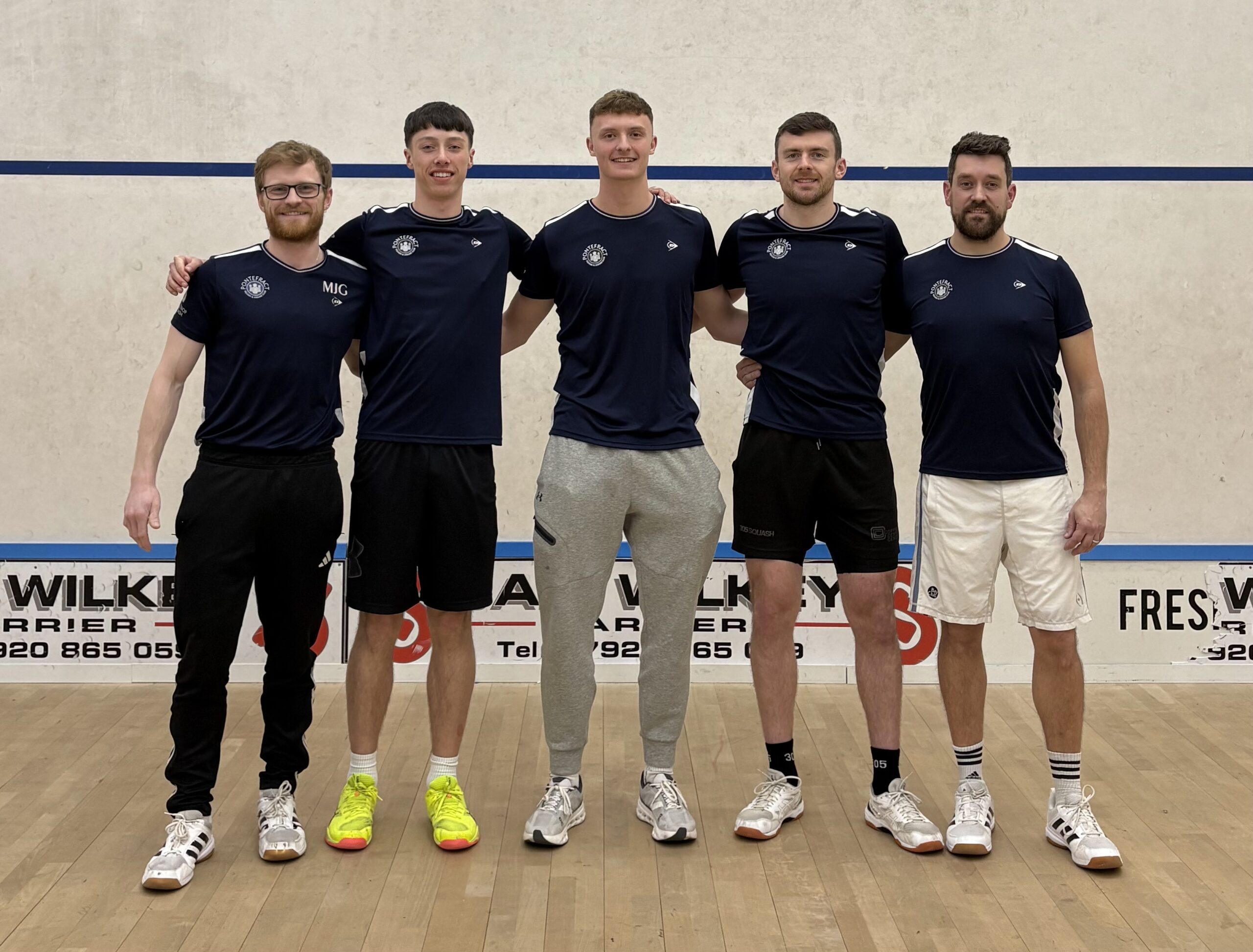
Pontefract were crowned Yorkshire Premier League champions for the first time in 15 years after Wednesday nights victory at Woodfield sealed the title with two games to spare.
The world-renowned West Yorkshire club have dominated from week one of the season back in October, losing just once in 16 matches. Several players, including world no.56 Patrick Rooney, four-time British Junior Open winner Sam Todd and 17-year-old Chester Dockray, boast unbeaten records throughout the triumphant campaign.
Pontefract went into Wednesdays clash at Woodfield knowing that a maximum 20 points would guarantee the title, putting an irretrievable distance between themselves and second-placed Hallamshire. Despite winning, Ponte only secured 18 points, but once news filtered through of Hallamshires 17-8 defeat at Dunnington, the champagne corks could start popping.
In fact, it was a night of double celebration for Pontefract. Back at base, their second team thrashed Wakefield to secure promotion from Division 1, ensuring that both Ponte teams would be reunited in the top tier next season.
First team skipper Matt Godson said: Id like to thank the efforts of every team-mate who has committed their time this season, from the pro players who have shown their loyalty, down to the club stalwarts who have turned out every week for years.
Id also like to thank Mick Todd, James Willstrop, Vanessa Atkinson, Jayne Robinson and so many others for everything they do to keep our club surviving and thriving.
I would also like to put equal attention on the achievements of the second team. It was a hammer blow last year when they went down as it means a lot to our members to have two teams competing in the YPL and seeing top class squash every Wednesday. If anything, Im more pleased that weve been able to bring that back at the first time of asking!
The platform for Pontes title-clinching victory at Woodfield was laid by early victories for Dockray and Godson. Adam Taylor then sealed the five winning bonus points with a four-game win over Woodfield head coach Alex Cutts.
Gunning for the maximum points they needed, 21-year-old talent Todd cruised past Londoner Caleb Boy, setting up an all-star battle between Rooney and England team-mate Declan James at top string. But it was Woodfields James, resurgent after a long injury lay-off, who took it in four games. Ponte celebrations were briefly on hold until the text came through from Dunnington.
Victories from Ed Shannon, Taminder Gata Aura and Jamie Brown earned Dunnington a 17-8 win, with Oliver Jones and Temwe Chileshe posting consolation victories for the 2022/23 champions Hallamshire, who were without three-time world champion Nick Matthew due to injury.
At the bottom, the battle to avoid the one relegation place could go to the wire. Cleethorpes remain at the foot of the table by eight points despite a morale-boosting 15-6 victory at home to Ferriby Hall on Wednesday. Straight-games victories for their middle order of Elliot Morris Devred, Toby Ponting and Harry Falconer were enough to earn a fifth victory of the campaign.
Just above the dotted line are Abbeydale, who profited from a contravention of the rules by Doncaster. Last years champions won the fixture 14-8 on the night, but were later docked points due to playing four full-time pro players, transgressing the rule introduced at last summers AGM. Thus, Abbeydale claimed a 15-6 victory after being awarded 3/0 wins at fourth and fifth string in addition to Rhys Evans victory of Joel Arscott at no.1.
That result puts Doncaster 12 points above the drop zone, with Woodfield 10 points and Abbeydale eight clear of danger. But bottom side Cleethorpes victory this week ensures the final two fixtures of the season will be nervy for all four sides.
Wednesday nights other fixture saw Harrogate (joint third with Dunnington) claim a fifth successive win with a tight 14-10 triumph at Queens. Before the climatic no.1 clash, there were two winners but just one surname on each teamsheet Thomas Simpson and Chris Simpon winning for the visitors, and Cory Harding and Lewis Harding for Queens. New Zealand national champion Lwamba Chileshe clinched it for Harrogate at the death, courtesy of a 3/1 win over James Earles.
Ireland plot summer rebuild after hat-trick bid peters out
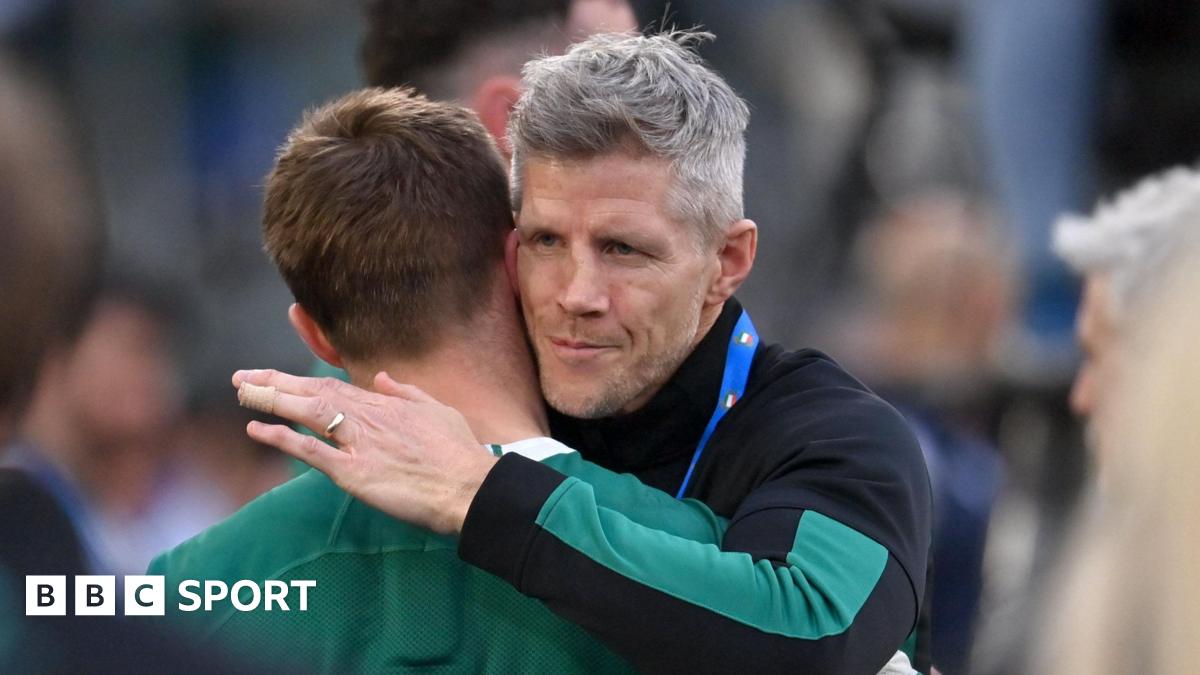
Ireland's attack is a key area of concern after it failed to click into gear and light up Stadio Olimpico on Saturday.
Ireland scored 17 tries and 135 points in the 2025 championship, their weakest return since 2021. France, in contrast, ran in 30 tries and 218 points.
Les Bleus may be in a different league in that regard, but England - who Ireland beat six weeks ago - scored 25 tries and 179 points to finish above Ireland in second.
Against Italy, Easterby had a well-established backline featuring the returning Crowley, Mack Hansen, James Lowe and Garry Ringrose, but still only scored 22 points, fewer than they managed against France.
The struggle to turn pressure inside the opponent's 22-metre line into points was prevalent throughout the autumn Tests and continued in the Six Nations.
Addressing Ireland's attack, which peaked in the second half of their opening game against England, Easterby said "we've seen really good things" while admitting there are "certain things that we feel we need to get better at".
"A lot of that is under pressure situations, how good are guys, how accurate they are with decision-making.
"All the things that make a good rugby player. We've got to keep pushing that and trying to expose them in those sort of situations."
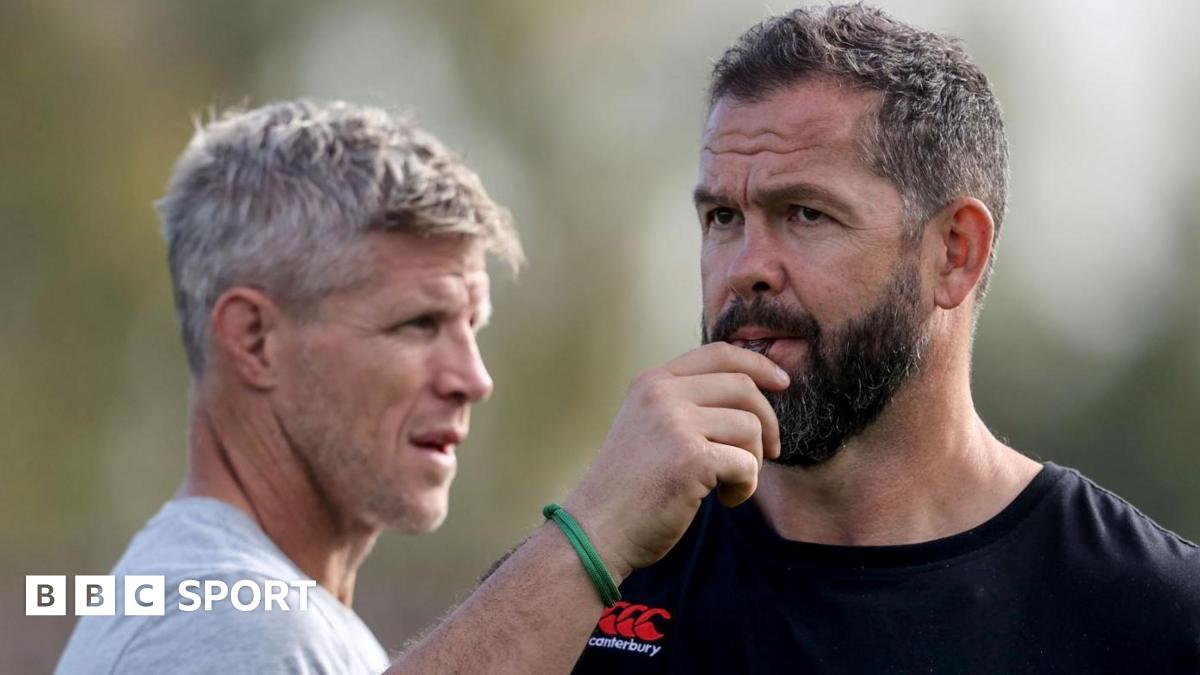
The Irish Rugby Football Union (IRFU) has refused to comment on reports linking Ireland's interim coach Simon Easterby with a role as part of Andy Farrell's British and Irish Lions coaching ticket for this summer's tour of Australia.
A report in the Daily Telegraph, external said that Farrell, who is on a sabbatical from his Ireland head coach role as he plans for the Lions tour, was set to appoint Easterby to his coaching team.
Easterby has been expected to lead Ireland's summer tour of Georgia and Portugal.
When contacted about the report on Monday morning, an IRFU spokesman replied: "At this point, we have no comment to make".
Farrell is expected to confirm the composition of his Lions coaching team later this month.
Speaking before the Lions link emerged, Easterby said he was "committed" to Ireland and "pretty happy where I am" after rumours of succeeding Warren Gatland as Wales coach swirled earlier in the championship.
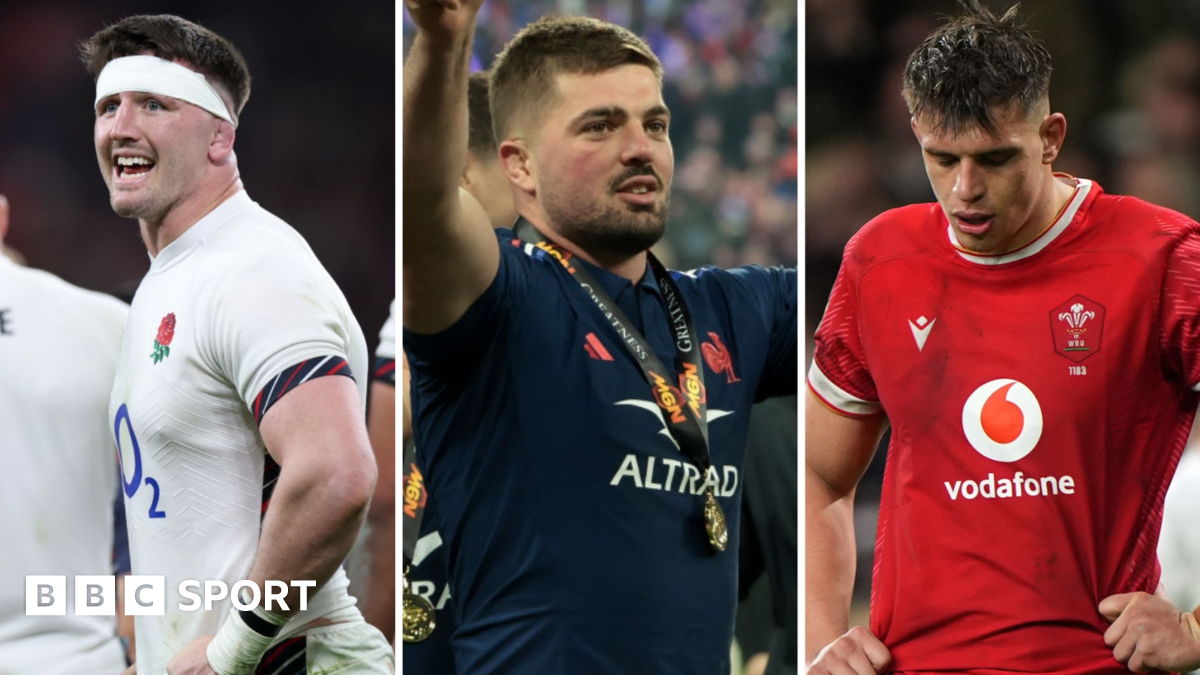
Heading into the final round, England knew they almost certainly needed a big bonus-point win in Cardiff to have a shot at a first title since 2020.
Narrow victories over France and Scotland came through a more conservative gameplan, before Borthwick delivered on his promise that his side would play more aggressively in attack during the seven-try win over Italy.
England were even more ruthless in their final game in Cardiff, as they scored 10 tries to hammer Wales at the Principality Stadium
Picking three 'fetchers' in the back row helped lay the platform for England's dominance, with both Curry brothers and Ben Earl bossing the breakdown.
"I think England have got the best back row in the championship," former Scotland captain John Barclay told BBC's Six Nations Rugby Special.
"Both Curry brothers and Earl were world class. It is not just the breakdown, but there is a physical raw edge to everything they are doing.
"It all makes your job so much easier, their back row were unbelievable."
In this year's Six Nations, England lead the way for turnovers won (36), slowing down their opponents' ruck speed, and jackals won (21).
The depth in the back row is only growing after 20-year-old Northampton Saints flanker Henry Pollock scored two tries on his debut, 21-year-old Chandler Cunningham-South also dotted down twice against Wales, while number eight Tom Willis, 26, impressed on his three starts.

Sergio Ramos was sent off in the final minutes of Monterrey's victory over Pumas UNAM on Sunday, his first dismissal since he moved to Liga MX.
Ramos was involved in a numous physical battles during the game. Monterrey were already 3-1 up on 92 minutes when he tackled Guillermo Martínez before kicking the forward as the ball rolled out of play.
It is the 30th red card of Ramos' career -- he was dismissed 28 times for Madrid and once for Sevilla, although he was never sent off for Spain.
Ramos has scored three goals in four games since joining Monterrey last month.
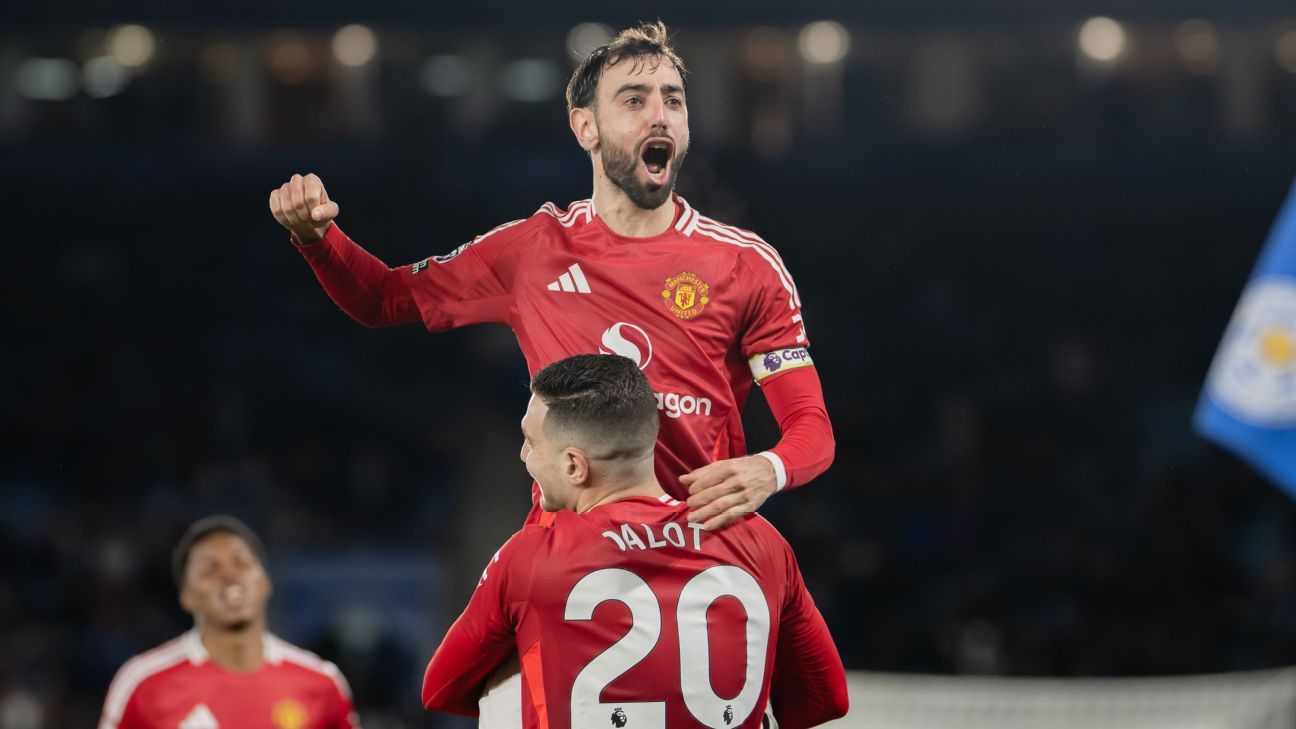
Manchester United captain Bruno Fernandes said he has plenty of respect for the Premier League club's former skipper Roy Keane but he wants to do things in his own way after the Irishman criticised his work rate.
Fernandes, who was named man of the match for his performance in United's 3-0 win at relegation-threatened Leicester City in the Premier League on Sunday, was criticised by Keane in an appearance on the Stick to Football podcast.
The 30-year-old Portugal midfielder has often been criticised for his on-field demeanour and has admitted in the past that his gesticulating and complaining can rile up both teammates and opponents.
"I do things in my own way," Fernandes told Sky Sports. "Obviously it's not nice to hear those things about you, but at the same time it motivates you and obviously people think there's a lot of things you need to improve.
"Obviously not everything I do everyone will like or think in the same way and I respect everyone's opinion and I have huge respect for Roy Keane and I accept there's a lot of margin for improvement in my game, in my leadership and everything I do in my life."
Fernandes has scored 16 goals and registered 15 assists in 44 appearances across all competitions for United this season. He netted once and provided two assists in their victory over Leicester.
United are 13th in the Premier League with 37 points from 29 matches.
"He's a special guy in that aspect, he is always ready, he can recover quite well," United manager Ruben Amorim said of his captain. "I don't know the future but I'm reading what the performance department tell me, the numbers, and then what I see in the game.
"I always see a Bruno that is dangerous and one Bruno that can recover in every situation. So he is going to stay there. I already knew Bruno. What surprised me the most is the way he works every day."
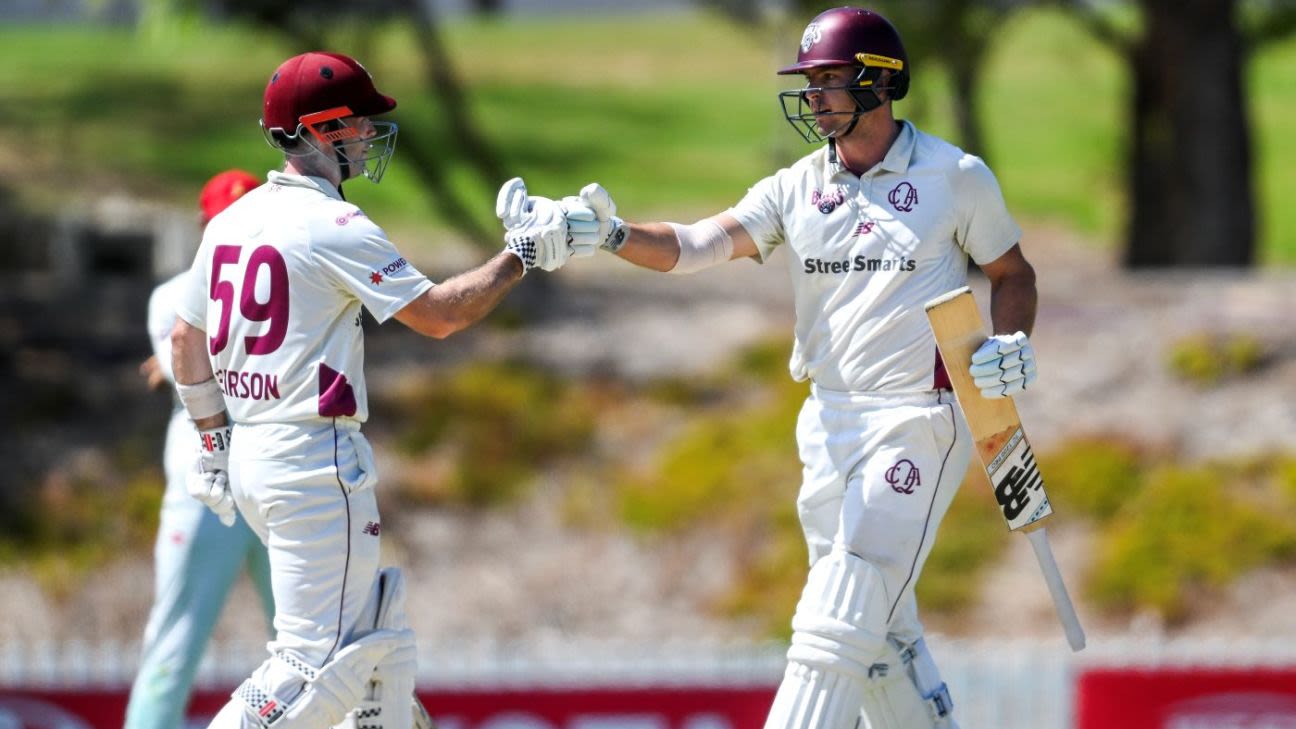
South Australia 66 for 2 (Sangha 24*, Labuschagne 1-12) & 614 for 7 dec lead Queensland 370 (Peirson 128, Wildermuth 104, Neser 68, McAndrew 3-68) by 310 runs
Looking shot at stumps on day two, Queensland have batted themselves back into the complicated equation that will decide who plays top side South Australia in the final.
By reaching 330 inside 100 overs in their first innings on Monday, Queensland picked up vital batting bonus points against SA at Karen Rolton Oval.
Assuming their match ends on Tuesday with a tame draw, Queensland will return to play SA in the final at the same venue - provided neither New South Wales somehow beat Tasmania or Western Australia produces a miracle chase against Victoria.
Queensland started the last round in second place, but SA's imposing 614 for 7 declared set the agenda and then the visitors crashed to 110 for 5 by the end of day two.
Then Wildermuth cut loose, belting 104 from only 90 balls, with 11 fours and three sixes, as he and Peirson racked up 151 in their seventh-wicket stand.
Most importantly, Peirson and Wildermuth took the score to 356 after 100 overs to secure 1.56 batting bonus points, which made up for only securing 0.4 bowling bonus points in the first innings.
Wildermuth and then Peirson were dismissed after their jobs done. Peirson played an outstanding knock, top-scoring with 128 in 281 balls with nine fours and a six.
Queensland were dismissed for 370 and predictably, South Australia batted again given a result is unlikely.
Neser was rested for the remainder of Monday's play, clearly with an eye to the final, as Queensland nervously monitored scores from the WACA and Bellerive.
SA reached 66 for 2 at stumps in their second innings, with Jason Sangha (24) and Nathan McSweeney (eight) looking for pre-final batting practice on the final day.
Faf du Plessis appointed Axar Patel's deputy at Delhi Capitals
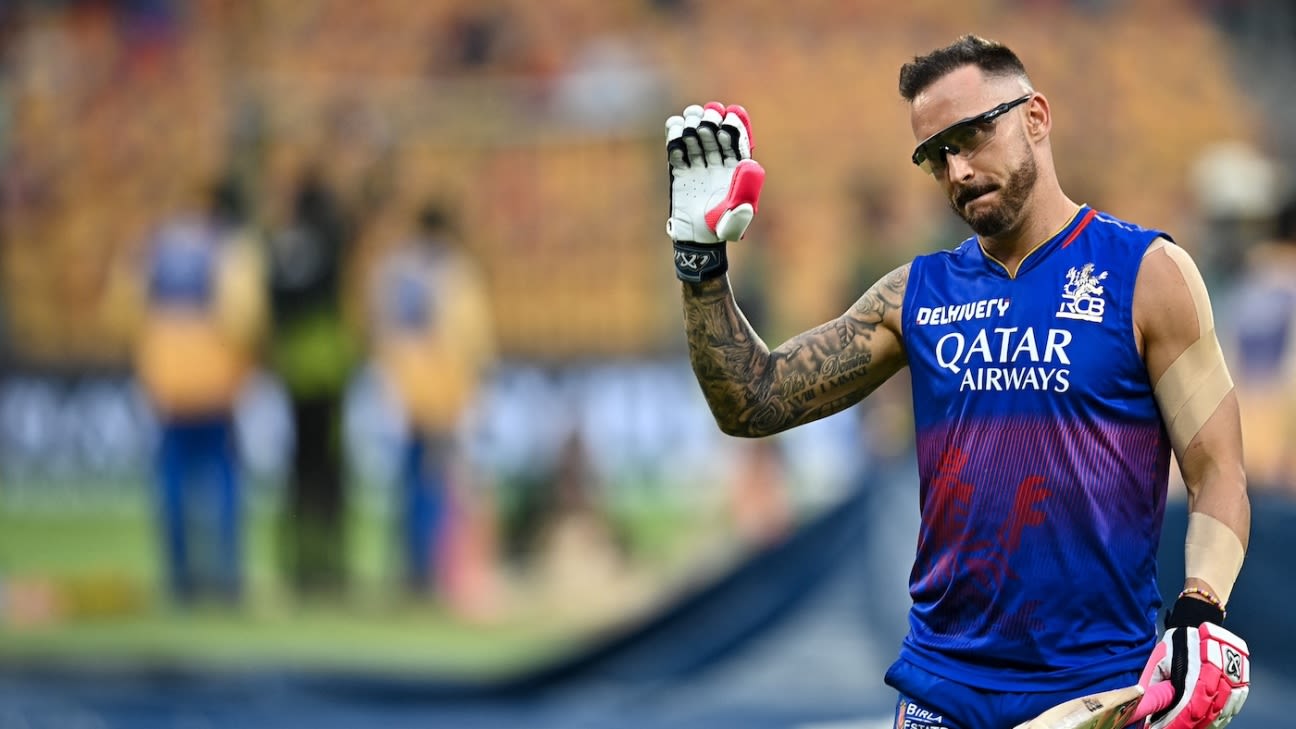
Du Plessis, who was the captain at Royal Challengers Bengaluru (RCB) till the end of IPL 2024, was released by the franchise ahead of the mega auction last year, and was subsequently acquired by DC for his base price of INR 2 crore (US$0.24 million). He was chosen ahead of KL Rahul, another former IPL captain who moved to DC this year.
Du Plessis, a former South Africa captain in all formats, became a part of the IPL in 2012 after Chennai Super Kings (CSK) brought him on board. He remained a part of the team till the end of the 2015 season, moved to Rising Pune Supergiant/s for two seasons when CSK were banned from the IPL, and went back to CSK, staying there till 2021. RCB bought him at the auction in 2022 and, with Virat Kohli stepping down as the team's captain ahead of that season, was given charge of the team. He led them for three seasons, and while RCB reached the playoffs in both 2022 and 2024, they are yet to win the trophy they have chased for 17 seasons now.
Overall in the IPL, the 40-year-old du Plessis has 4571 runs from 145 matches at an average of 35.99 and a strike rate of 136.37. He remains active in the franchise cricket circuit, and last turned out in the SA20 for Joburg Super Kings earlier this year. He could also be in demand when the teams start building their squads for the upcoming season of the Hundred, with Southern Brave, now owned by the GMR Group that also owns DC, working on a deal to bring him on board.

CINCINNATI -- Two of the NFL's most prominent wide receivers will be with the Cincinnati Bengals for the foreseeable future.
Ja'Marr Chase and Tee Higgins told Fox Sports on Sunday that they have agreed to contract extensions. Chase agreed to a four-year, $161 million deal that includes $112 million guaranteed, while Higgins agreed to a four-year, $115 million deal that is guaranteed for the first two years, they told Fox Sports.
Chase's deal has an annual average of $40.25 million, setting an NFL record for the highest average annual salary for a non-quarterback.
The agreements conclude years of negotiations for each player. And quarterback Joe Burrow, who has been vocal in advocating for Chase and Higgins to get new contracts, now has his top targets secured.
"We have several guys like [Chase] who have stepped up for us and deserved to be paid," Burrow told ESPN at the Pro Bowl Games in January. "And deserve to be paid what they're worth."
Chase, who turned 25 on March 1, is coming off one of the best seasons by a receiver in NFL history. He became the fifth player since the AFL-NFL merger in 1970 to win the receiving triple crown, leading all players in receptions (127), receiving yards (1,708) and receiving touchdowns (17).
Higgins, 26, was hampered by injuries last season but was still productive when on the field. He was 10th in receiving yards per game (75.9), according to ESPN Research. He also caught 10 touchdowns in 12 appearances.
Each player was under team control for the upcoming season. Chase was on the final year of his rookie deal. The Bengals placed the franchise tag on Higgins for the second straight year.
However, the methods used by the team to control the salaries for both players caused plenty of consternation.
Ahead of the 2024 free agency period, Higgins requested a trade after he was franchise-tagged for the first time. The second-round pick in the 2020 draft ultimately decided to play last season on the tag.
A few months later, Chase conducted a "hold-in" during training camp in which he did not participate in any team activities. He ended his stalemate with the club ahead of the first game of the season.
Both players were ultimately rewarded for not only their previous efforts but for what they bring to the team in the future.
"We're paying guys for what they're going to give us," Bengals director of player personnel Duke Tobin said at the league's scouting combine in February. "We're not just paying guys for what they've already done."
Tobin, the team's de facto general manager, also made it clear the Bengals wanted to give Chase a historic contract. Chase's record for non-quarterbacks breaks the mark briefly held by Cleveland Browns defensive end Myles Garrett, who recently signed a four-year deal worth $40 million annually.
And any lingering issues from the rough first negotiation between the Bengals and Chase -- in which, sources told ESPN's Adam Schefter, Chase felt misled -- had been smoothed over by this offseason.
At the scouting combine, Bengals coach Zac Taylor said he and Chase have a "great relationship" that includes the ability for the star receiver to provide feedback to the team's offensive playcaller.
"Ja'Marr does a great job of not just spewing answers that he doesn't think through because he wants the ball," Taylor said. "There's been times he said, 'Hey, man, everything else we're doing is working, and I'm just going to keep doing my thing over here, even though I haven't gotten a lot of touches.' But it's our job to put him in a position to get touches early in every single game."
Last season, the Bengals boasted one of the league's most efficient offenses. Cincinnati ranked eighth in points per drive, sixth in touchdowns per drive and fourth in touchdowns per pass attempt.
That wasn't enough to keep the Bengals from missing the playoffs for the second straight season. The repeat playoff absences occurred after back-to-back trips to the AFC Championship Game, including a victory and Super Bowl appearance in Chase's rookie season in 2021.
With Chase and Higgins now under new multiyear deals, Cincinnati has the playmakers to rebuild its status as a title contender.















 Phone: (800) 737. 6040
Phone: (800) 737. 6040 Fax: (800) 825 5558
Fax: (800) 825 5558 Website:
Website:  Email:
Email: 






